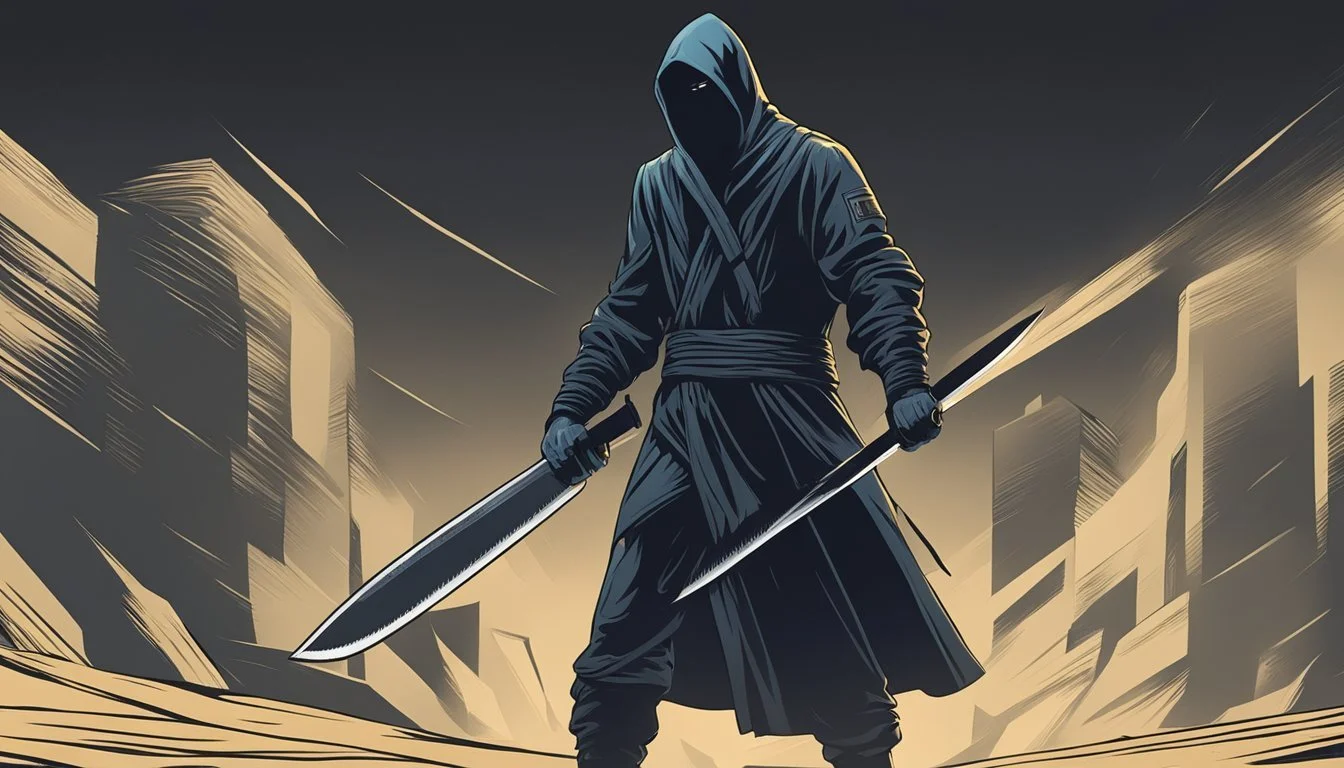Juan Corona: 6 Chilling Documentaries on the Machete Murderer
Exploring the Legacy of a Serial Killer
Juan Corona's brutal crimes shocked California in the early 1970s. The Mexican-born labor contractor was convicted of murdering 25 migrant farmworkers, whose bodies were found buried in peach orchards near Yuba City. His case drew national attention and remains one of the most notorious killing sprees in U.S. history.
Several documentaries have examined Corona's life and crimes, offering viewers insight into this dark chapter of criminal history. These films explore the investigation that led to Corona's arrest, the evidence presented at trial, and the lasting impact of his actions on the victims' families and local community. Through interviews and archival footage, they aim to shed light on the motives and methods of this prolific serial killer.
1) The Chilling Case of the Machete Madness
Juan Corona's reign of terror in California's Sutter County during 1971 shocked the nation. The Mexican-born farm labor contractor brutally murdered 25 migrant workers, earning him the moniker "The Machete Murderer."
The gruesome discovery began when a peach farmer noticed a suspicious hole in his orchard. Police investigation revealed a horrifying scene - bodies of migrant workers buried in shallow graves throughout the area.
Corona's victims were found hacked to death, many with deep wounds to their heads and upper torsos. The brutality of the killings and the sheer number of victims made this one of the most notorious serial killer cases in U.S. history at the time.
The murders sparked fear among migrant communities and brought attention to the vulnerability of transient workers. Corona's arrest and subsequent trial captivated the public, shedding light on the dark underbelly of California's agricultural industry.
Corona was convicted in 1973 for the 25 murders. He spent the remainder of his life in prison, dying in 2019 at the age of 85. The case of the "Machete Murderer" remains a chilling chapter in American true crime history.
2) Blood on the Blade: Inside the Machete Murders
"Blood on the Blade: Inside the Machete Murders" offers a chilling examination of Juan Corona's brutal crimes. This documentary delves into the grisly details of the 25 murders committed in California's peach orchards.
The film explores Corona's background as a farm labor contractor and how he used his position to target vulnerable migrant workers. It presents a timeline of the killings, which took place in 1971 near Yuba City.
Viewers are given insight into the investigation that led to Corona's arrest. The documentary highlights the discovery of suspicious holes in an orchard, which ultimately led police to uncover the victims' bodies.
Forensic experts discuss the evidence that linked Corona to the crimes, including the machete used as the murder weapon. The film also touches on the impact these murders had on the local farming community and migrant workers.
"Blood on the Blade" provides a comprehensive look at one of America's most notorious serial killer cases, offering viewers a disturbing glimpse into the mind of the man known as the "Machete Murderer."
3) Machete Mayhem: A Killer's Confession
Juan Corona's brutal crimes shocked California in the early 1970s. This documentary explores Corona's own account of the murders, offering a chilling glimpse into the mind of a serial killer.
The film features interviews with law enforcement officials who worked on the case. It delves into Corona's background as a farm labor contractor and his relationships with the migrant workers he targeted.
Viewers learn about Corona's modus operandi, using a machete to kill his victims before burying them in shallow graves near orchards. The documentary examines the evidence that led to his conviction for 25 murders.
Corona's mental state and possible motivations are analyzed by forensic psychologists. The film also touches on his 1973 trial and subsequent appeals, providing insight into the legal proceedings.
This documentary stands out for its inclusion of Corona's own words, taken from prison interviews. His statements offer a disturbing perspective on the crimes that earned him the moniker "The Machete Murderer."
4) The Terror of Terror City
"The Terror of Terror City" is a lesser-known documentary that explores Juan Corona's crimes in Yuba City, California. The film delves into the community's reaction to the gruesome discoveries in 1971.
Yuba City, nicknamed "Terror City" during the investigation, became the epicenter of fear and suspicion. The documentary captures the tense atmosphere as locals grappled with the reality of a serial killer in their midst.
Interviews with residents and law enforcement officials provide firsthand accounts of the panic that gripped the area. The film highlights how Corona's actions shattered the sense of safety in this small agricultural community.
Archival footage and reenactments bring the era to life, showcasing the extensive search efforts in the peach orchards. The documentary also examines the impact on migrant workers, who were both Corona's victims and the target of increased scrutiny.
"The Terror of Terror City" offers a unique perspective on the case, focusing on the societal impact rather than just the crimes themselves.
5) Slices of Evil: Unmasking the Machete Murderer
"Slices of Evil: Unmasking the Machete Murderer" is a gripping documentary that delves into the heinous crimes of Juan Corona. The film meticulously examines the case that shocked California in 1971.
Through interviews with investigators and archival footage, the documentary reconstructs Corona's gruesome killing spree. It explores how he targeted and murdered 25 migrant farm workers over a short period.
The film provides insight into Corona's background as a farm labor contractor. It analyzes the factors that may have contributed to his transformation into one of America's most notorious serial killers.
"Slices of Evil" also highlights the investigation that led to Corona's arrest and conviction. The documentary presents a balanced view of the case, including the legal proceedings and appeals that followed.
Viewers gain a deeper understanding of the impact these crimes had on the rural community and the victims' families. The film serves as a chilling reminder of a dark chapter in California's history.
6) The Shadow Behind the Blade
"The Shadow Behind the Blade" is a gripping documentary that delves into the psychological profile of Juan Corona. The film explores the factors that may have contributed to his violent behavior.
Interviews with forensic psychologists and criminologists provide insights into Corona's troubled past and mental state. The documentary examines his childhood in Mexico and his experiences as an immigrant in California.
Experts discuss the possible impact of Corona's diagnosed schizophrenia on his actions. The film also investigates the role of cultural isolation and economic pressures in shaping his criminal path.
"The Shadow Behind the Blade" uses dramatic reenactments to illustrate key moments in Corona's life. These scenes are interspersed with archival footage and photographs to create a compelling narrative.
The documentary raises questions about the intersection of mental illness, societal factors, and criminal behavior. It offers a nuanced look at the complexities surrounding Corona's case and its broader implications for understanding serial killers.
Who Was Juan Corona?
Juan Corona was a Mexican-born serial killer convicted of murdering 25 migrant farm workers in California in 1971. His brutal crimes using a machete shocked the nation and earned him the nickname "The Machete Murderer."
Early Life and Background
Juan Vallejo Corona was born on February 7, 1934, in Autlán, Jalisco, Mexico. He immigrated to the United States in the 1950s, settling in California. Corona worked as a farm labor contractor in the Yuba City area, recruiting and managing migrant workers for local farms.
He married and had four daughters. Despite his outward appearance of a family man, Corona harbored violent tendencies. In 1956, he was committed to a mental hospital after a violent outburst but was released after receiving treatment.
Criminal Activities
Corona's murderous spree took place in 1971. He targeted male migrant workers, often those without families or connections. Corona lured victims with promises of work before brutally attacking them with a machete and burying their bodies in shallow graves in peach orchards.
His crimes were discovered when a farmer noticed disturbed soil in his orchard. Police unearthed 25 bodies, all victims of Corona's savage attacks. The scale of his killings made it one of the worst mass murders in U.S. history at the time.
Corona was arrested and convicted in 1973. He received 25 concurrent life sentences. Despite attempts to appeal, he remained incarcerated until his death in 2019 at age 85.
Investigations and Legal Proceedings
Juan Corona's crimes were uncovered in 1971, leading to one of California's most significant murder investigations. His trial and conviction marked a pivotal moment in the state's legal history.
Discovery of Crimes
On May 19, 1971, a peach farmer near Yuba City, California noticed a suspicious freshly dug hole in his orchard. When police investigated, they discovered a body buried in the ground. This grim finding sparked an extensive search of the surrounding area.
Over the next week, authorities uncovered 25 bodies in shallow graves throughout the peach orchards. The victims were all male migrant workers, brutally killed with machetes and other tools.
Investigators quickly focused on Juan Corona, a local farm labor contractor. Evidence found at the crime scenes, including receipts and bank deposit slips, linked Corona to the murders.
Trial and Conviction
Corona's trial began in September 1972, drawing national attention. The prosecution presented a strong case, including physical evidence and witness testimonies connecting Corona to the victims.
Corona's defense team attempted to argue insanity, but this strategy proved unsuccessful. After a lengthy trial, the jury found Corona guilty on all 25 counts of first-degree murder on January 18, 1973.
The judge sentenced Corona to 25 consecutive life terms in prison. He appealed the verdict, leading to a retrial in 1982. However, the second trial also resulted in conviction on all counts.
Corona remained incarcerated until his death in 2019 at the age of 85. His case remains one of the largest mass murder investigations in U.S. history.
Impact on Society
Juan Corona's brutal murders of migrant workers in California sent shockwaves through American society. The case exposed vulnerabilities in farm labor practices and sparked discussions about worker safety.
Public Reaction
The discovery of 25 bodies buried in orchards near Yuba City horrified local residents and the nation. Many felt a sense of betrayal that a respected labor contractor could commit such atrocities. Fear gripped migrant communities, with some workers refusing jobs in the area.
Media coverage was extensive, bringing attention to the often-overlooked lives of transient farm laborers. The public demanded answers about how the killings went undetected for so long. Vigils and memorials honored the victims, mostly Mexican nationals whose identities were difficult to confirm.
Legal Reforms
Corona's case led to calls for stricter oversight of farm labor contractors. California passed new laws requiring contractors to be licensed and bonded. Background checks became mandatory for those hiring large numbers of seasonal workers.
The murders also highlighted gaps in missing persons investigations. Law enforcement agencies developed better protocols for tracking and identifying migrant workers who disappeared. Improved communication between rural sheriff's departments was emphasized to detect patterns of violence against vulnerable populations.
Some jurisdictions created special task forces to investigate crimes against agricultural workers. These efforts aimed to build trust with migrant communities and encourage reporting of suspicious activities.





